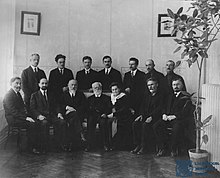Social Democratic Party of Georgia
Social Democratic Party of Georgia საქართველოს სოციალ-დემოკრატიული პარტია | |
|---|---|
| Founded | Late 1893 |
| Dissolved | c. 1954 |
| Split from | Left-wing |
| National affiliation | Russian Social Democratic Labour Party (Mensheviks) (until 1918) |
| International affiliation | Labour and Socialist International (1923–1940) |
| Constituent Assembly of Georgia | 109 / 130
|
| Election symbol | |
 | |
| Flag variant of Georgia between 1918 and 1921 when it was governed by the Social Democratic Party | |
 | |

In the first row: Seit Devdariani, Noe Ramishvili, Noe Zhordania, Karl Kautsky and his wife Luise, Silibistro Jibladze, Razhden Arsenidze;
in the second row: Kautsky's secretary Paul Olberg, Victor Tevzaia, K. Gvarjaladze, K. Sabakhtarashvili, S. Tevzadze, A. Urushadze, R. Tsintsabadze
The Social Democratic Party of Georgia (
The party was prior to 1917 "ambivalent" on Georgia's independence from Russia, for which it has been criticized by some Georgians as "unpatriotic and anti-national". Natalie Sabanadze describes them as "unique in their non-nationalist approach to national liberation." She argues that "they led a highly successful national movement while maintaining a degree of hostility towards nationalism and avoiding the use of nationalist rhetoric and ideology."
In March 1921, the Georgian government was overthrown by the Red Army invasion. The party was liquidated in Georgia during the Soviet repressions predating to the failed anti-Soviet August Uprising in 1924. From 1921 onwards, the party began operating in exile, particularly in France, Germany (until 1933) and the United States. A Foreign Bureau was set up as the new leading organ of the party. The party was a member of the Labour and Socialist International between 1923 and 1940.[4]
Notable members
- Kristine Sharashidze
- Razhden Arsenidze
- Nikolay Chkheidze
- Akaki Chkhenkeli
- Benia Chkhikvishvili
- Seit Devdariani
- Vladimir Darchiashvili
- Evgeni Gegechkori
- Grigol Giorgadze
- Ivane Gomarteli
- Evgen Gvaladze
- Ioseb Iremashvili
- Valiko Jugheli
- Noe Khomeriki
- Grigol Lordkipanidze
- Vlasa Mgeladze
- Ivane “Barbayiannis” Passaldze
- Isidore Ramishvili
- Noe Ramishvili
- Victor Tevzaia
- Irakli Tsereteli
- Grigol Uratadze
- Noe Zhordania
- Huseyngulu Mammadov
See also
References
- ^ ISBN 9789639776531.
- ISBN 9780698170100.
But then came world war, revolution, and imperial dissolution, and voila-Georgian Menshevism had morphed into a vehicle for Georgian nationalism.
- ISBN 0-253-20915-3.
- ^ Kowalski, Werner. Geschichte der sozialistischen arbeiter-internationale: 1923 - 19. Berlin: Dt. Verl. d. Wissenschaften, 1985. p. 336.
- Stephen F. Jones, Socialism in Georgian Colors: The European Road to Social Democracy, 1883-1917, ISBN 0-674-01902-4
